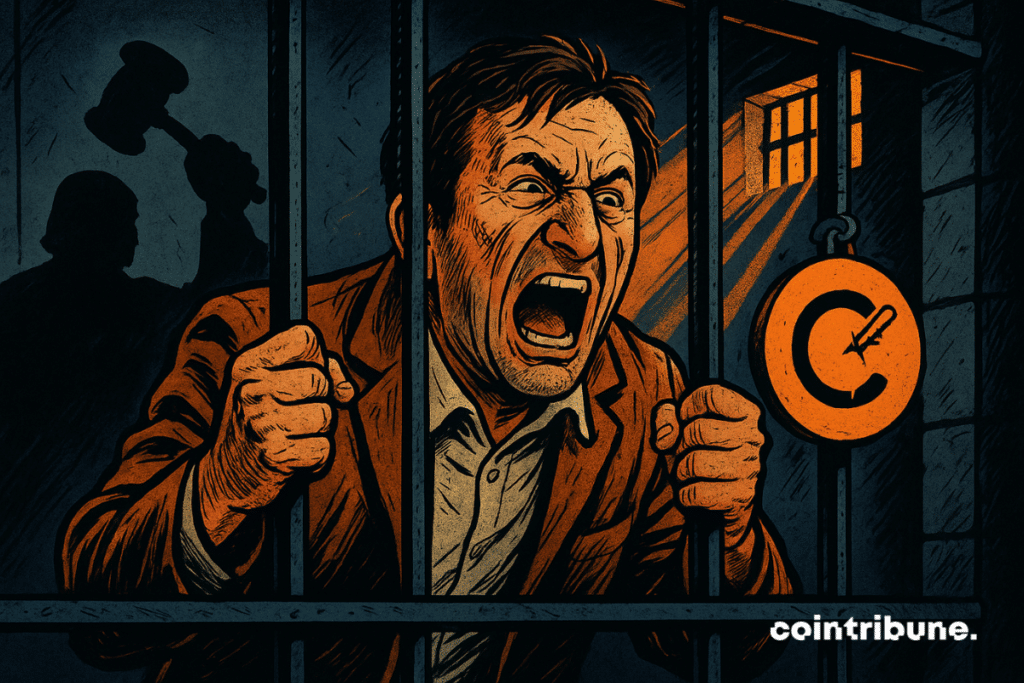20 Years for Crypto Fraud? Former Celsius Boss Cries Foul
Alex Mashinsky, the long-glorified — then reviled — face of Celsius, returns to the spotlight, but this time, it is no longer for his speeches on financial freedom. The former CEO appears as the accused, denouncing American justice as too harsh for his taste. While the Department of Justice demands a 20-year sentence, the 59-year-old man cries excess: for him, this punishment would be equivalent to a “death sentence in prison.”

In Brief
- Alex Mashinsky, ex-CEO of Celsius, faces 20 years in prison for fraud and market manipulation.
- He defends himself by denouncing overly harsh justice, while the prosecution sees him as a calculating fraudster.
- Behind this trial, the whole ideal of crypto wavers between decentralized dream and human failings.
A Symbolic Sentence, or an Exemplary Punishment?
The fall is harsh. Mashinsky, who once promised freedom through crypto, now faces imprisonment. He pleaded guilty to two charges — commodity fraud and manipulation of the CEL crypto price.
These maneuvers brought him $48 million, pocketed just before the resounding collapse of Celsius in June 2022. A move deemed cynical by the prosecution, who sees it as calculated betrayal.
But his lawyers temper this: their client is more the embodiment of a clumsy entrepreneur than a seasoned criminal.
According to them, Mashinsky is a “non-violent first-time offender”, with a clean past and three decades of spotless business. Comparing him to a predator would, in their view, be a grotesque exaggeration. An excess of judicial zeal.
And this is where the narrative battle takes shape. The Department of Justice paints a cold, calculating, lying man, while the defense describes a scapegoat trapped in an economic and institutional storm. Who to believe? The CEO who made himself the champion of decentralized finance, or the strategist who took advantage of a system on the brink of collapse?
Celsius, or the Programmed Shipwreck of a Financial Mirage
To understand the scale of the scandal, we must go back to summer 2022. Celsius suspended withdrawals, citing volatile market conditions, and eventually filed for bankruptcy.
Four and a half billion dollars owed to creditors. Broken lives, vanished savings, crypto hopes reduced to dust. Mashinsky, meanwhile, had already secured his millions.
Hundreds of victims shared their testimonies. Many had bet all their savings, some convinced by Mashinsky’s reassuring pitches.
He promised a system fairer than banks, but Celsius turned out to be nothing but a mirage: opaque, centralized, and deeply vulnerable to the same failings as the institutions it claimed to surpass.
Even after the chaos, a glimmer persisted. In November 2023, a court approved a restructuring plan. By August 2024, over $2.5 billion had been returned to 251,000 creditors. A bandage, certainly, but not a cure. The damage was done.
Today, as sentencing time approaches, the crypto community watches. For some, Mashinsky must pay dearly, becoming the example to deter future fraudsters. For others, his conviction would be a distraction, a spectacle aimed at reassuring an angry public.
Mashinsky’s trial goes beyond himself. It reflects a larger tension in the crypto world: that between the decentralized utopia and human reality, often greedy, sometimes cynical. At a time when the sector seeks legitimacy, this case reminds us that innovation never exempts responsibility.
Crypto is not impunity. It is — or should be — the demand for absolute transparency. Mashinsky is playing his last card. And the whole world watches, even if for Nassim Taleb, Bitcoin is just a technological tulip.
Maximize your Cointribune experience with our "Read to Earn" program! For every article you read, earn points and access exclusive rewards. Sign up now and start earning benefits.

Fascinated by Bitcoin since 2017, Evariste has continuously researched the subject. While his initial interest was in trading, he now actively seeks to understand all advances centered on cryptocurrencies. As an editor, he strives to consistently deliver high-quality work that reflects the state of the sector as a whole.
The views, thoughts, and opinions expressed in this article belong solely to the author, and should not be taken as investment advice. Do your own research before taking any investment decisions.